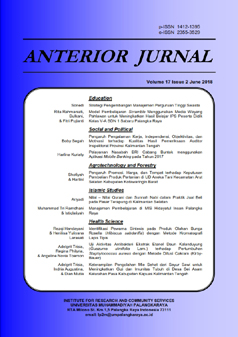EVALUASI IMPLEMENTASI KEBIJAKAN PROGRAM KELOMPOK USAHA BERSAMA (KUBE) DI WILAYAH PESISIR KABUPATEN KOTAWARINGIN TIMUR (Studi Kasus Pada Desa Serambut dan Desa Bapinang Hilir Laut Kecamatan Pulau Hanaut)
Evaluation of the Implementation of the Joint Business Group (Kube) Program Policy in the Coastal Area Of East Kotawaringin Regency
DOI:
https://doi.org/10.33084/anterior.v23i2.6986Keywords:
Evaluation, Poverty, KUBEAbstract
Poverty is an issue that requires attention and intervention. One of the poverty alleviation programs is the Joint Business Group Program (KUBE) implemented in the coastal areas of East Kotawaringin District. Evaluation is conducted to determine the extent to which the implemented policies bring about changes in the living standards of the impoverished communities. This research aims to describe and analyze the effectiveness, efficiency, adequacy, equity, responsiveness, and accuracy of the KUBE Program. The study involved thirteen informants. Data were collected through observation, interviews, documentation, and literature review. Data analysis utilized an interactive analysis model involving data reduction, presentation, and conclusion drawing. This qualitative study employed a case study approach to provide insights into the actual implementation of the KUBE program for evaluation using evaluation theory proposed by William N. Dunn. The research findings indicate that: effectiveness, the KUBE program has been successful in improving the living standards of its members, although the implementation of the program through collective or group efforts was not feasible; efficiency, the KUBE program adheres to applicable regulations; adequacy, the received funds can fulfill the equipment needs for work in better conditions; equity, each group member receives new work equipment according to their respective needs; responsiveness, the fund assistance for business development through the KUBE program is utilized to rejuvenate the work equipment of aid recipients; accuracy, the recipients of the KUBE program are individuals listed in the Integrated Social Welfare Data (DTKS).
Downloads
References
Aditya, Rifki., Rizka, Muhammad Arief., dan Tamba, Wayan. 2018. Evaluasi Implementasi Program Kelompok Usaha Bersama (KUBE) dalam Mengatasi Kemiskinan di Kota Mataram. Jurnal Kependidikan Jurnal Hasil Penelitian dan Kajian Kepustakaan di Bidang Pendidikan Pengajaran dan Pembelajaran. Volume 4. Nomor 2. Hal 192-197. Diunduh 18 November 2020, dari situs World Wide Web: (https://researchgate.net).
Ananda, R dan Rafida, T. 2017. Pengantar Evaluasi Program Pendidikan. Medan: Perdana Publishing.
Dunn, William. N. 2003. Pengantar Analisis Kebijakan Publik. Edisi Kedua. Gadjah Mada University Press. Yogyakarta.
Gunawan, Imam. 2017. Metode Penelitian Kualitatif: Teori dan Praktik. PT. Bumi Aksara. Jakarta.
Peraturan Menteri Sosial Republik Indonesia Nomor 25 Tahun 2015 tentang Kelompok Usaha Bersama (KUBE).
Downloads
Published
How to Cite
Issue
Section
License
Copyright (c) 2024 Tiny Sukmawaty Burnama

This work is licensed under a Creative Commons Attribution-ShareAlike 4.0 International License.
All rights reserved. This publication may be reproduced, stored in a retrieval system, or transmitted in any form or by any means, electronic, mechanical, photocopying, recording.












